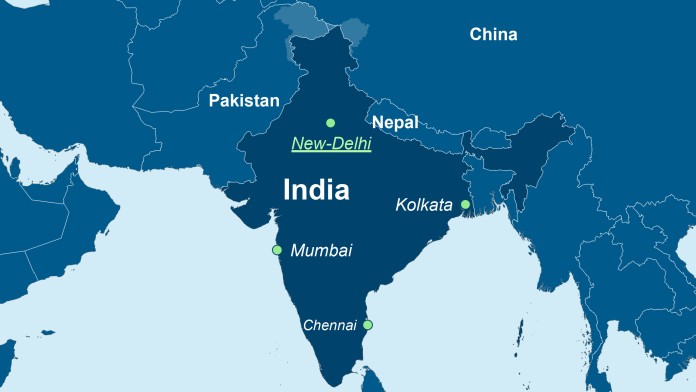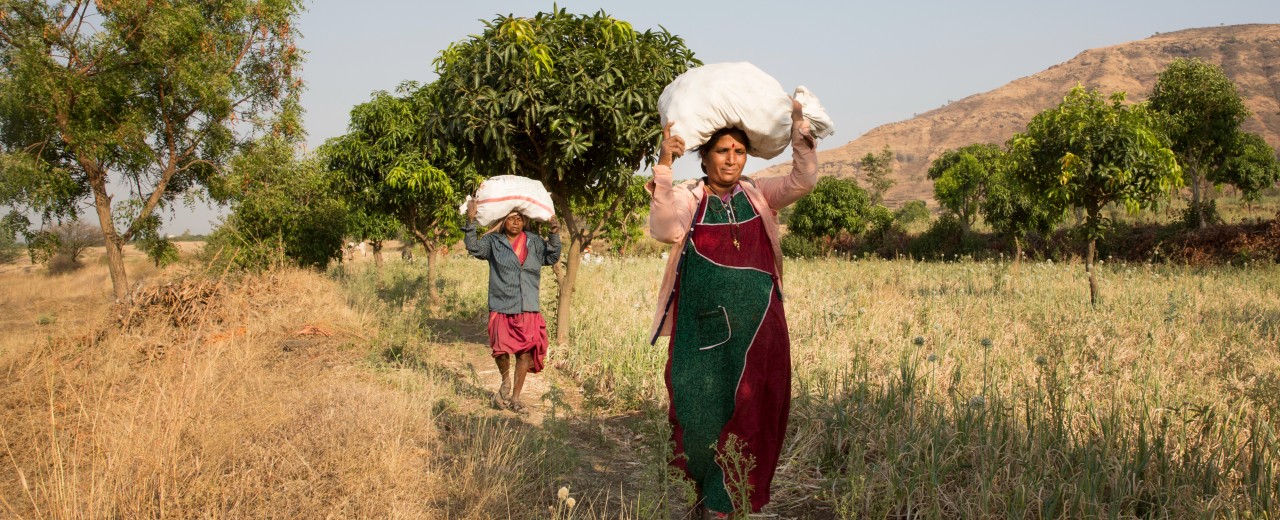
As of: 08/2022
India is a country of contrasts. A subcontinent with 1.4 billion people: High-rise buildings, advanced technology and computer specialists in the cities, and villages, farmland and farmers aplenty in the countryside. There is a growing middle and upper class. Yet around 400 million Indians still live in extreme poverty.
The majority of India’s population, in particular poorer members of society, live in rural areas – although they no longer mainly make their living from farming. The farms are very small and an increasing amount of arable land has been degraded. And climate change is playing a role in this destruction through droughts and flooding.
KfW has launched a new, innovative project, issuing a loan of more than EUR 90 million to promote climate resilience and more sustainable agriculture on smallholdings in the state of Andhra Pradesh. This does not reimburse the costs of the programmes – the money is only released when results are achieved.
The Indian population is not only growing in the cities, it also continues to grow in the countryside. Between now and 2030, the rural population is forecast to grow from 700 to 900 million people. Today, some 260 million people in rural India live in extreme poverty. It is becoming increasingly difficult to generate enough income from agriculture, with 60% of arable land and around 40% of forested areas classed as degraded and at risk of being destroyed.
In Andhra Pradesh, too, soil degradation is increasing as a result of soil life destruction and humus depletion, mainly due to the improper use of mineral fertilisers and synthetic pesticides. In addition, the size of farms is continuously becoming smaller due to divided inheritance of the land and immense population pressure. Around 54 million people live in Andhra Pradesh. Agriculture, which yields a relatively meagre living, is still the main source of income for about 6 million farming families in the state.
Since 2016, the Government of Andhra Pradesh (GoAP) has been working to expand community-managed natural farming, a chemical-free approach to farming based on the principles of regenerative agriculture. This is geared towards what is known in India as natural farming, which prioritises healthy soils, soil life and landscape restoration, diversification, and biodiverse production while rejecting the use of synthetic pesticides or fertilisers. The cooperation with self-help groups in the villages is a practice that satisfies the elements of agroecology as defined by the Food and Agriculture Organization (FAO).
Climate-resilient natural agriculture is practised by around 500,000 farmers in Andhra Pradesh as of 2021. The government’s aim is to increase this to 6 million farmers. Due to the significant financing requirements involved in transitioning to agroecological principles, the government of Andhra Pradesh has opted to receive German Financial Cooperation funds.

The project aims to help stabilise and increase the long-term agricultural incomes of around 120,000 predominantly extremely poor farming families in Andhra Pradesh. At the same time, efforts are being taken to strengthen the farmers’ climate resilience while improving the fertility of the soil.
On behalf of the Federal Ministry for Economic Cooperation and Development (BMZ), KfW Development Bank has already concluded a loan agreement for EUR 90 million and a grant of EUR 1 million to support the project. Under the results-based approach, the money will only be released after the agreed development-related outcomes have been achieved. The loan amounts will be disbursed in tranches after it is independently verified that the results have been achieved. Unlike traditional investment projects, costs will not be reimbursed; instead, success in transitioning to the desired system will be rewarded.
In the area of agroecology, KfW is also promoting the “Indo German Global Academy of Agroecology Research and Learning (IGGAARL)” project, which aims to make the results from agroecological research available in Andhra Pradesh and beyond in line with international standards, with the aim of improving rural living conditions (primarily food security, income and health) and stabilising environmental efforts. Farmers are involved in research and pass on the new methods (farmer-focused research). IGGAARL studies are intended to help provide evidence for the effectiveness of agroecological methods. The aim is to increase acceptance of natural cultivation, which will lead to more families opting for innovative, sustainable farming and raising their standard of living. The selection and breeding of resistant crop species helps to consolidate yields and minimise crop failure. It also serves to adapt to climate change.
Based on agroecological approaches developed in India, the programme in Andhra Pradesh is tailored to the local conditions and will undergo continuous further development. The efforts are focused on natural farming through close involvement and cooperation with smallholders, who will produce the necessary inputs themselves. Farmers will use natural resources such as cow dung, mulch, cow urine and plant extracts. This is a more horticultural, manual labour-intensive production technique, so the project also includes a limited amount of funding for small horticultural equipment.
Agroecological production techniques will revitalise the soils and increase the plants’ resistance to diseases, cyclones and droughts as a result of having stronger roots. In addition, the supply of nutrients improves when the humus layer is built up and soil life is activated, with soil fertility increasing thanks to a variety of micro-organisms such as earthworms, bacteria, fungi, algae and single-celled organisms. The knowledge and advice required for the transformation will be provided by a large number of consultants who live in the villages and apply the new production techniques themselves.
Given that female farmers perform a large share of agricultural work, women are a mainstay of the project. In addition, they will help to promote the approach and spread it more widely in the villages.
Many women are organised in self-help groups that work for social change and improved health, which means they are very well connected and this allows them to share their experiences. These groups have become important promoters of the approach in Andhra Pradesh.
Since the approach has proven very successful, the government of Andhra Pradesh wants to expand it to the entire state and is already considering a second phase of financing.
Now the approach is also attracting increasing attention in other Indian states. The degree of success in each case is to be evaluated by accompanying research, which will regularly examine the effects on income and the environment. This will then be critically scrutinised by the Indian central government with regard to security of food supply at national level.
The Academy of Agroecology Research and Learning in Andhra Pradesh is also used to review the approach, as well as to refine the natural farming methods. So far, there has been little funding for research in natural and organic farming in comparison with traditional farming, which has led to a relatively high backlog in terms of improving knowledge of production technology and yields, contributing to the mitigation of climate change and ecosystems, as well as economic output and poverty reduction.
The project contributes to the achievement of these following United Nations Sustainable Development Goals:
KfW Group
KfW Development Bank
KfW Office New Delhi
Share page
To share the content of this page with your network, click on one of the icons below.
Note on data protection: When you share content, your personal data is transferred to the selected network.
Data protection
Alternatively, you can also copy the short link: kfw-entwicklungsbank.de/s/enzBYvxJ
Copy link Link copied